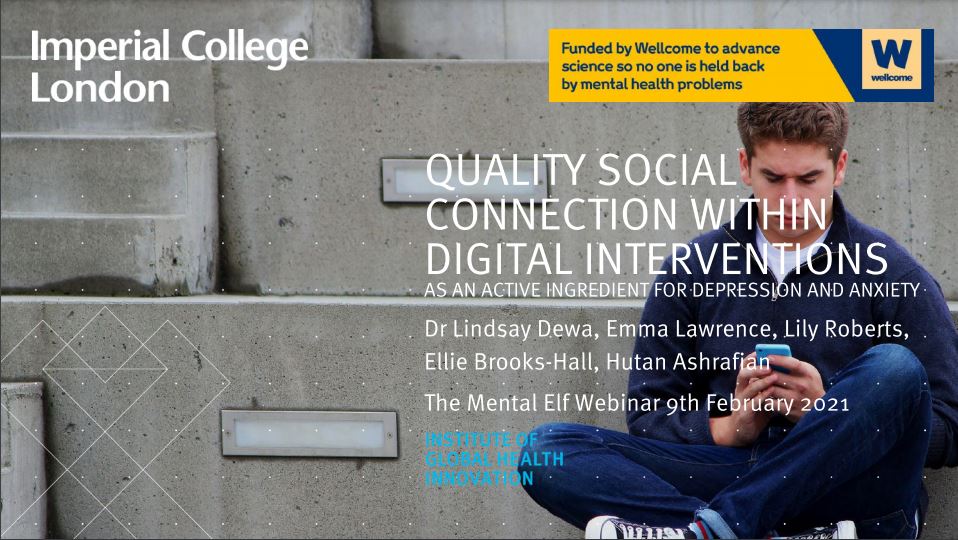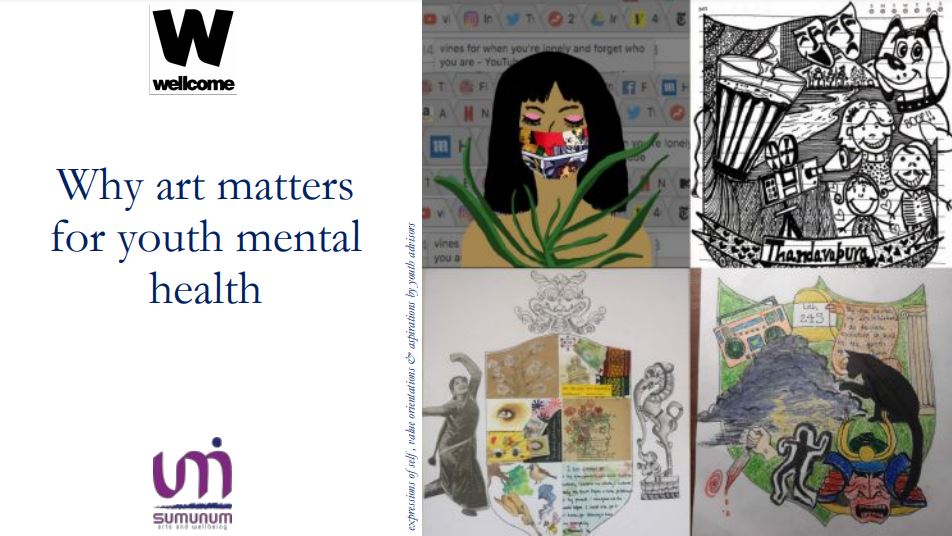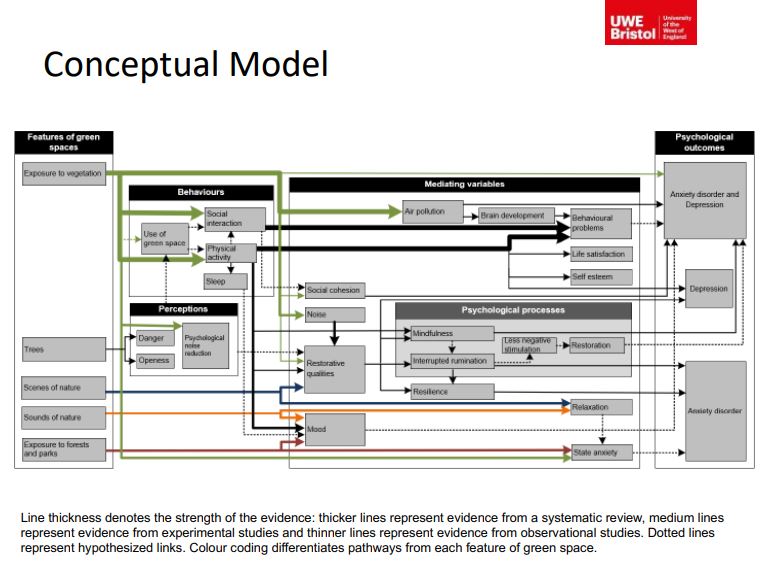We are LIVE!
#ActiveIngredientsMH
Youth Mental Health webinar brought to you by the @TrustWellcome and us, The Mental Elf!
#ActiveIngredientsMH
Youth Mental Health webinar brought to you by the @TrustWellcome and us, The Mental Elf!
A warm welcome to this #ActiveIngredientsMH live webinar which will explore the active ingredients, or the aspects of interventions that really make a difference, to prevent, treat and manage #anxiety or #depression in #youngpeople worldwide.
I’m Laura @LHemming123 from the @Mental_Elf and I’ll be live tweeting this @TrustWellcome session on #ActiveIngredientsMH https://wellcome.org/what-we-do/our-work/mental-health-transforming-research-and-treatments
Coming up:
@LindsayDewa - positive digital social connections
@JacobJCrouse - body clocks & sleep cycles
@KamalaEaswaran @sumunum - arts engagement
@JoanneBeames - affective awareness
Roz Shafran - perfectionism
Dr Issy Bray - green spaces
#ActiveIngredientsMH
@LindsayDewa - positive digital social connections
@JacobJCrouse - body clocks & sleep cycles
@KamalaEaswaran @sumunum - arts engagement
@JoanneBeames - affective awareness
Roz Shafran - perfectionism
Dr Issy Bray - green spaces
#ActiveIngredientsMH
First up Grace Gatera and Shuranjeet Singh put lived experience front and centre of this discussion - they ask why is it that we involve young people in research about young people? #ActiveIngredientsMH
Grace Gatera says - lived experience HAS to guide research. All of us have lived experience and we know that when we engage this in the core of the work we do, the work gets better #ActiveIngredientsMH
Grace's recommendation: include lived experience from the very beginning to the very end. People with lived experience are the gift that keeps on giving #ActiveIngredientsMH
People with lived experience shouldn't only be asked to participate in or disseminate research, they should be given a say in the research too, says @Shuranjeet #ActiveIngredientsMH
@Shuranjeet top 3 recommendations:
1. Focus on the whole jigsaw, not just your piece
2. Share skills across communities
3. Researchers and people with lived experiences are both constant teachers AND students. Reflect on this.
#ActiveIngredientsMH
1. Focus on the whole jigsaw, not just your piece
2. Share skills across communities
3. Researchers and people with lived experiences are both constant teachers AND students. Reflect on this.
#ActiveIngredientsMH
Today we’ll be hearing about some of the projects commissioned by @TrustWellcome in 2020.First up, we have @LindsayDewa speaking about positive digital social connections #ActiveIngredientsMH
@LindsayDewa explains that quality social connection is not how many connections we have, but the perceived value of these connections. Positive connections can be a protective factor, and digital interventions can help to foster these connections #ActiveIngredientsMH
@LindsayDewa and colleagues wanted to know - do social connections help depression and anxiety when using digital interventions (e.g. social media, smartphone apps, chatrooms)? #ActiveIngredientsMH
@LindsayDewa is now explaining how they involved young people with experience of depression and anxiety in their systematic review and meta-analysis #ActiveIngredientsMH
@LindsayDewa & colleagues found that:
- There were several indicators of social connection - e.g. relatedness, feeling accepted
- Depression and anxiety outcomes improved after social connection
- An absence of social connection led to poorer outcomes
#ActiveIngredientsMH
- There were several indicators of social connection - e.g. relatedness, feeling accepted
- Depression and anxiety outcomes improved after social connection
- An absence of social connection led to poorer outcomes
#ActiveIngredientsMH
There were also several considerations and mechanisms that impact outcomes, e.g:
- Forum moderation
- Confidentiality
- Ease of access
- Anonymity
- Peer support
#ActiveIngredientsMH
- Forum moderation
- Confidentiality
- Ease of access
- Anonymity
- Peer support
#ActiveIngredientsMH
@LindsayDewa and colleagues created a conceptual framework for digital quality social connection which incorporates:
- Rapport
- Identify and commonality
- Valued interpersonal dynamic
- Engagement
- Responded to and accepted
#ActiveIngredientsMH
- Rapport
- Identify and commonality
- Valued interpersonal dynamic
- Engagement
- Responded to and accepted
#ActiveIngredientsMH
If you’d like to hear more about young people and digital life during #lockdown, take a look at our #EmergingMinds webinar with @OrbenAmy and @PeteEtchells - “Teens, screens and quarantines” #ActiveIngredientsMH
Next up, we have @JacobJCrouse talking about sleep-wake cycles and body clocks #ActiveIngredientsMH
Disturbances in sleep cycles are common in individuals with anxiety and depression, says @JacobJCrouse #ActiveIngredientsMH
@JacobJCrouse & colleagues established the "brain and mind centre youth lived experience working group" (LEWG) to work with them on this review #ActiveIngredientsMH
There are 3 key reasons to support body clocks as an active ingredient in depression, says @JacobJCrouse
1. Body clock dysfunction is clinically meaningful in depression
2. Body clocks are measurable
3. Body clock timing can be changed with treatment
#ActiveIngredientsMH
1. Body clock dysfunction is clinically meaningful in depression
2. Body clocks are measurable
3. Body clock timing can be changed with treatment
#ActiveIngredientsMH
Check out this #OxfordMentalHealth video on sleep and dreams with Prof Russell Foster and Kristin Scott Thomas #ActiveIngredientsMH
@KamalaEaswaran & colleagues ran multi-modal arts workshops with YP. There were 6 arts modules: storytelling, spoken word & lyrical expression, material installations, experiential drama & movement, live performance. They also conducted interviews. #ActiveIngredientsMH
However, the arts may be:
- Inappropriate for youth with depression, anxiety / PTSD in areas of active conflict
- Ineffective as a standalone intervention for youth with severe depression / anxiety
#ActiveIngredientsMH
- Inappropriate for youth with depression, anxiety / PTSD in areas of active conflict
- Ineffective as a standalone intervention for youth with severe depression / anxiety
#ActiveIngredientsMH
@KamalaEaswaran ends by asking “when has art NOT changed the world?” This research shows that art-based interventions can be used as a prevention and treatment intervention for young people with depression or anxiety. #ActiveIngredientsMH
Next up, @JoanneBeames is going to tell us about affective awareness in young people
#ActiveIngredientsMH
#ActiveIngredientsMH
@JoanneBeames & colleagues wanted to know:
1. Can ecological momentary assessment (EMA) increase affective awareness?
2. Can affective awareness reduce depression risk?
3. What do experts think about affective awareness & EMA?
#ActiveIngredientsMH
1. Can ecological momentary assessment (EMA) increase affective awareness?
2. Can affective awareness reduce depression risk?
3. What do experts think about affective awareness & EMA?
#ActiveIngredientsMH
@JoanneBeames & colleagues found that:
- affective awareness is a foundational skill that is important for emotional health
- EMA can be used as a therapeutic tool
- EMA can be used as a measurement tool
#ActiveIngredientsMH
- affective awareness is a foundational skill that is important for emotional health
- EMA can be used as a therapeutic tool
- EMA can be used as a measurement tool
#ActiveIngredientsMH
Next up, we have Professor Tracey Wade speaking about perfectionism as an active ingredient in youth anxiety and depression #ActiveIngredientsMH
Tracey & colleagues had a research advisory group of young people work with them on a synthesis of qualitative research as well as a realist synthesis of information #ActiveIngredientsMH
Tracey & colleagues found that there was a close interplay between perfectionism, depression and anxiety. Websites currently do not contain much practical advice on perfectionism #ActiveIngredientsMH
Our final talk is from Dr Issy Bray and she’ll be talking about how exposure to green space can reduce the risk of anxiety and depression among young people in urban settings #ActiveIngredientsMH
Issy explains that young people with lived experience of anxiety or depression helped to inform the search strategy, commented on the conceptual model and contributed to a vlog aimed at young people #ActiveIngredientsMH
Issy & colleagues devised a conceptual model which incorporates features of green spaces, behaviours, perceptions, mediating variables and psychological outcomes #ActiveIngredientsMH
Now we have a question and answer session with our speakers - use the hashtag #ActiveIngredientsMH to send me any questions you have for our speakers!
@andretomlin kicks us off by asking whether we've created an unhelpful division between 'researchers' and 'people with lived experience'?
Roz Shafran agrees and adds that it's unhelpful to pigeon hole people into having only one area of expertise #ActiveIngredientsMH
@LindsayDewa adds that co-production helps to eradicate this demarcation between 'researcher' and 'lived experience' by sharing the power between collaborators #ActiveIngredientsMH
@Shuranjeet speaks about the hierarchy of knowledge as being responsible for this demarcation - experiential knowledge can present a tension between more established forms of knowledge derived from clinical research. How can we combine these knowledges? #ActiveIngredientsMH
Now we're talking about what is needed from research funders to enable the meaningful involvement of people with lived experience #ActiveIngredientsMH
Issy Bray and @LindsayDewa are grateful for the @wellcometrust Active Ingredients funding for placing such a strong emphasis on lived experience, and feel that all funding should prioritise this #ActiveIngredientsMH
@KamalaEaswaran @sumunum states that it is custom for her to work with people with lived experience, because her work is based mainly in implementation, rather than research. Should this be the norm in research too?
Issy bray speaks now about the challenges of working in an inter-disciplinary team, but states that "it works" and can be a real benefit in terms of dissemination #ActiveIngredientsMH
Cat Sebastian is now telling us about the new 2021 @wellcometrust Active Ingredients Commission which focuses on NEW active ingredients that haven’t yet been covered. https://wellcome.org/what-we-do/our-work/mental-health-transforming-research-and-treatments#commissions-dce9
@wellcometrust are looking for rigorous reviews on what works, for whom, in what contexts, and why? #ActiveIngredientsMH
You can find out more about the 2020 #ActiveIngredientsMH projects here:
Blogs - https://elfi.sh/ActiveIngredientsMH
Podcasts - https://soundcloud.com/national-elf-service/sets/active-ingredients
Videos - https://youtube.com/playlist?list=PLSKM2Zm6MngIca_CqsMrYaKrYwWUCjGcL
Blogs - https://elfi.sh/ActiveIngredientsMH
Podcasts - https://soundcloud.com/national-elf-service/sets/active-ingredients
Videos - https://youtube.com/playlist?list=PLSKM2Zm6MngIca_CqsMrYaKrYwWUCjGcL
A big thank you to everyone who joined us for this webinar!
Grace Gatera
@Shuranjeet
@LindsayDewa
@JacobJCrouse
@KamalaEaswaran @sumunum
@JoanneBeames
Tracey Wade
Roz Shafran
Issy Bray
@wellcometrust
#ActiveIngredientsMH
Grace Gatera
@Shuranjeet
@LindsayDewa
@JacobJCrouse
@KamalaEaswaran @sumunum
@JoanneBeames
Tracey Wade
Roz Shafran
Issy Bray
@wellcometrust
#ActiveIngredientsMH

 Read on Twitter
Read on Twitter








